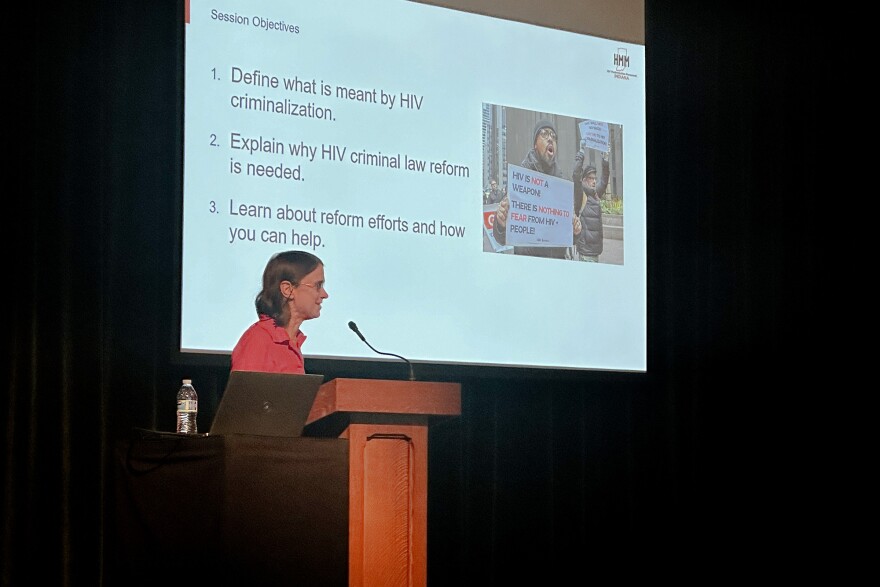Community health centers and Ryan White HIV AIDS Program centers play an important role in expanding services and care for vulnerable populations, including HIV prevention and wellness. The Damien Center – Indiana’s oldest and largest HIV service organization – hosted its first HIV advocacy summit Wednesday to develop strategies for the upcoming legislative session.
Carrie Foote, a professor of sociology at Indiana University-Indianapolis, has been living with HIV since 1988 and leads HIV Modernization Movement-Indiana. She said Indiana has several laws that lead to the inappropriate arrest or prosecution of people living with HIV — which wastes state resources and has no public health benefit.
“We can end the epidemic,” Foote said. “We can end it, so anything that's a barrier to doing that — and these laws are — we want to get rid of and improve.”
Foote said these laws lead to stigma around HIV that act as a barrier to testing and care — which gets in the way of preventing new transmissions and optimizing wellness for people living with HIV.
There are six laws that criminalize HIV in Indiana — which include both public health and criminal codes.
Two relate to the donation, sale or transfer of semen for artificial insemination, blood or plasma when someone “knowingly” has HIV. Another two focus on alleged non-disclosure of someone’s HIV status. When the laws were originally written, they said people living with HIV have a “duty to inform” sexual and needle sharing partners of their states prior to “high-risk activity.”
“The disclosure law used to be called ‘Duty to Warn,’” Foote said. “We came with a warning label before we had sex. So first, I need to warn you that I have HIV. That's the language. How stigmatizing is that?”
Advocates were able to work with lawmakers to revise the language to be less stigmatizing, but the disclosure law still exists in Indiana code.
The last two enhance punishments for battery or malicious mischief by bodily fluid or waste for people living with HIV. For example, Foote said for someone who doesn’t live with HIV, spitting on someone is considered a misdemeanor.
“For anybody living with viral hepatitis or HIV, it gets enhanced to a felony crime solely because of their HIV status, even though those diseases are not transmitted that way,” Foote said.
Join the conversation and sign up for the Indiana Two-Way. Text "Indiana" to 765-275-1120. Your comments and questions in response to our weekly text help us find the answers you need on statewide issues and the election, including our project Civically, Indiana.
Foote said legislative reform around the issue focuses on efforts to repeal HIV specific criminal laws and remove enhanced penalties based solely on a person’s HIV status. Advocates also want to modernize or reform laws to reflect the current science of HIV transmission and HIV as a chronic manageable condition, as well as narrow the law to situations that involve the “intent to transmit” or a “substantial risk of transmission.”
Foote is collaborating with the University of California-Los Angeles School of Law’s Williams Institute to analyze the enforcement of HIV criminalization in Indiana. She said not all of the HIV criminalization laws have been used, but many have led to arrests.
“People also are being convicted under these laws, so that right there tells you that change needs to occur because we have these people being prosecuted in ways that are unfair and don't reflect advances in modern science,” Foote said.
Foote said in addition to creating harmful stigma, HIV criminalization disproportionately affects Black people, sexual minorities and people who inject drugs, which makes health inequities worse.
READ MORE: HIV organizations say more work needs to be done to reach Black women
The Damien Center event also focused on different challenges these community centers face when trying to provide services and how threats to a federal program can make care more complicated.
The 340B drug pricing program was created in partnership with pharmaceutical companies — which agreed to provide “significant” discounts to eligible health care providers in order to participate in the Medicaid program.
Community health centers, also known as federally qualified health centers, are designed to increase access to primary care by reducing barriers such as cost, lack of insurance and distance. Ryan White centers are a part of the federal program designed to increase access to care for HIV.
Colleen Meiman, the national policy advisor for state and regional associations of Community Health Centers, said the program allows these centers to stretch federal resources to reach more patients and provide comprehensive services to vulnerable populations.
“340B is about so much more than pharmaceuticals,” Meiman said. “340B is essential to the financial sustainability of many, many, probably the majority of health centers.”
She also said the 340B program is facing several threats at the federal level, but some states have been able to pass legislation to protect the program.
Damien Center President and CEO Alan Witchery said the event was meant to identify issues that advocates and organizations want to address moving forward.
“There really isn't an opportunity for nonprofits to come together and think about just doing this kind of advocacy,” Witchery said.
Witchery said he wants there to be a continued conversation around lobbying, advocacy and education efforts for these organizations to promote their causes together as a group around the state.
Abigail is our health reporter. Contact them at aruhman@wboi.org.


